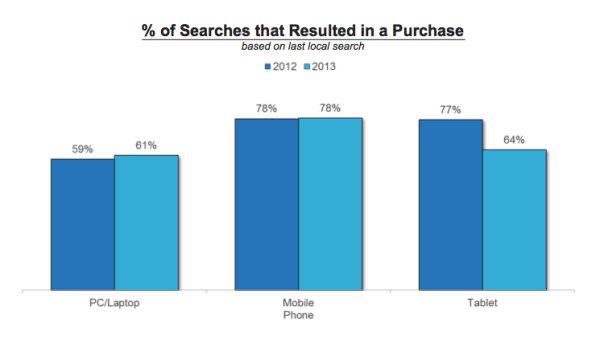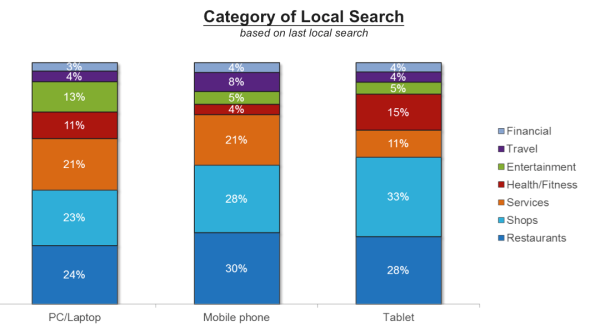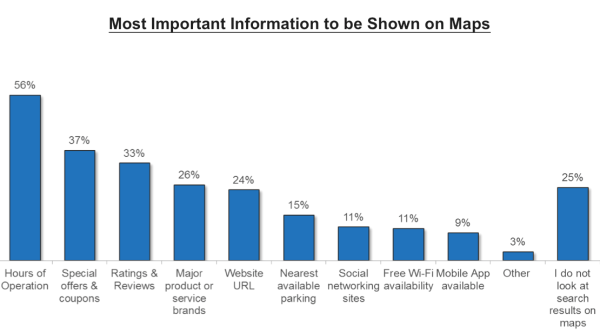Study: 78 Percent Of Local-Mobile Searches Result In Offline Purchases
Today comScore, Neustar Localeze and agency 15 Miles released the findings from their latest Local Search Study. Now in its seventh year, the survey of nearly 5,000 US adults was conducted in December 2013. Respondents “were individuals who [had] conducted a local business search in the last twelve months.” There were also behavioral data captured […]
Today comScore, Neustar Localeze and agency 15 Miles released the findings from their latest Local Search Study. Now in its seventh year, the survey of nearly 5,000 US adults was conducted in December 2013.
Respondents “were individuals who [had] conducted a local business search in the last twelve months.” There were also behavioral data captured in the study, which examined search behavior across search engines, yellow pages and local directory sites and “portals.”
There is a wealth of data about consumer behaviors and attitudes toward local search and content discovery across platforms and devices.
Nearly all (96 percent) of PC owners conduct local searches. By comparison, 79 percent of mobile phone owners and 81 percent of tablet owners used those devices for local searches. Satisfaction with the overall experience declined across device categories since last year, but was highest for the PC, followed by tablet and mobile. Other than for “on the go” information, PCs were preferred devices for local search because of greater usability and access to information.

Source: comScore, Neustar Localeze, 15 Miles
The top reason for local search was to find a specific business. However the second most common reason was to find a business with the product or service desired (category search). So while many local searchers are looking for “name in mind” information, a substantial number don’t have a specific business in mind (especially tablet users).
Comscore observed, “Nearly half of all service, restaurant and travel searchers were looking for a business they have never made a purchase from before.” The advertising implications of this finding are relatively obvious.
Source: comScore, Neustar Localeze, 15 Miles
All three categories of devices are used in roughly equal proportions for specific business lookups, product or service comparisons and purchases. As might be expected, mobile devices are used less often for purchases and more often for specific business lookups. All three device categories are also used to varying degrees throughout the purchase cycle.
Nearly 80 percent of local searches on mobile devices turned into purchases, with nearly 90 percent of those purchases being in a physical store (73 percent) or on the phone (16 percent) vs. online (11 percent). Roughly three-fourths (76 percent) of those purchases happened the same day and most (63 percent) within a few hours. However time to purchase varied by category and degree of consideration involved.
The top categories for local search were fairly consistent across platforms. Restaurants remained the single largest or most common local search category except on tablets.
Source: comScore, Neustar Localeze, 15 Miles
Younger users are more inclined to use mobile devices for local search than older users. But the total audience is becoming more multi-platform with 39 percent of respondents overall using multiple devices for local search. By comparison the PC-only audience was 49 percent and the mobile-only audience was 12 percent.
There were a number of questions in the survey about mapping and navigation. Among them was an investigation of the types of content users wanted to see displayed in a map context. Hours of operation was most important, followed by coupons and reviews.
Source: comScore, Neustar Localeze, 15 Miles
I don’t know how much of the study will be made available publicly. At least some of it will. However, for those interested, discussion of these findings will be available on a comScore-hosted free webinar later today.
Contributing authors are invited to create content for Search Engine Land and are chosen for their expertise and contribution to the search community. Our contributors work under the oversight of the editorial staff and contributions are checked for quality and relevance to our readers. The opinions they express are their own.
Related stories


